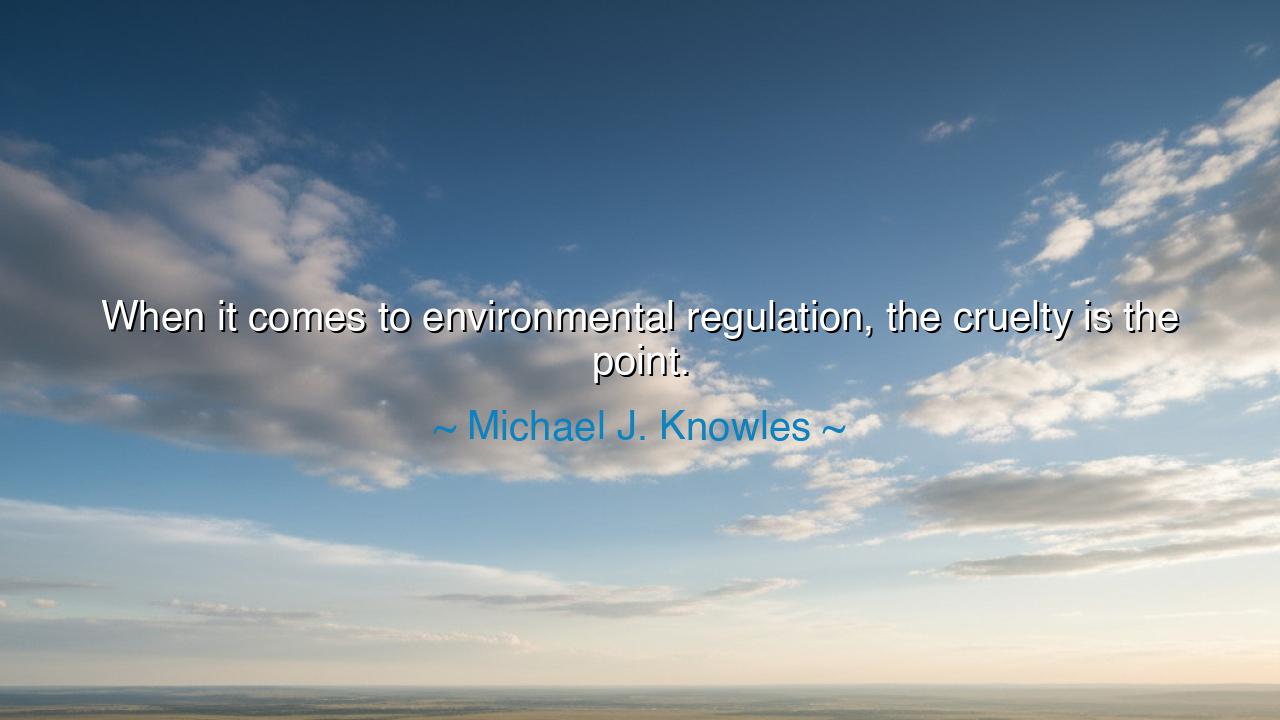
When it comes to environmental regulation, the cruelty is the






Hear now the words of Michael J. Knowles, who declared with fire and severity: “When it comes to environmental regulation, the cruelty is the point.” These words strike like iron upon an anvil, for they reveal not only the conflict of policies, but the hidden spirit of malice that can sometimes guide them. They are not the quiet reasoning of law, but the unveiling of intent—that certain burdens placed upon the earth and upon its people are not accidents of ignorance, but deliberate instruments of power.
He speaks of environmental regulation, which in its noblest form is meant to guard the forests, the rivers, the skies, and the health of those who dwell upon the land. Yet Knowles reminds us that regulation, in the hands of those without compassion, may be twisted. Instead of protecting the weak, it may burden them. Instead of healing creation, it may wound those least able to resist. Thus he declares: the cruelty is the point—the suffering caused is not a byproduct, but the desired end, meant to display control and break the spirit of dissent.
Consider, O listener, the Dust Bowl of the 1930s. The soil of the Great Plains, stripped of its covering and exhausted by poor farming practices, rose in black clouds that choked both land and people. The response of industry and government was often slow, and at times harsh. Families were uprooted, forced to migrate west, treated as intruders by those who still had bread. The suffering was not simply the result of nature, but of the indifference and policies of men who placed profit above people. The cruelty, as Knowles warns, had become the point: the weak bore the cost, while the powerful stood unmoved.
So too did the Roman Empire in its decline strip its provinces bare. Grain was seized from Africa to feed the capital, while the provinces starved. Forests were cut, lands eroded, rivers fouled, and yet the Senate cared little, for the suffering of distant peoples reinforced their dominion. Here again, cruelty was not merely an unfortunate side effect—it was the instrument by which the empire reminded its subjects of their helplessness.
The emotional force of Knowles’ words is anger, righteous and unflinching. He tears away the veil of polite debate to reveal the cold heart beneath certain policies. By naming cruelty as the point, he warns us not to be lulled by claims of efficiency or necessity when the fruit of those claims is suffering. He calls us to see clearly, to discern intention from accident, and to recognize when harm is inflicted not by mistake, but by design.
The lesson for you, O seeker, is this: never take suffering at face value. Ask who benefits when the weak are burdened, who profits when the land is stripped, who gains when the people are silenced by exhaustion. For often you will find that the cruelty is not chaos, but calculation. To guard the earth and its people requires more than laws; it requires the courage to expose malice where it hides beneath fine words.
What then shall you do? First, open your eyes and refuse to be deceived by rhetoric that cloaks cruelty in reason. Second, stand with the vulnerable—the farmer, the laborer, the poor family—who often bear the cost of careless or malicious rule. Third, fight for regulation that heals rather than harms, that lifts rather than crushes, that protects the earth not as a possession of the few, but as a gift for all.
And remember always: as Michael J. Knowles declared, sometimes cruelty is the point. But cruelty can be resisted, exposed, and overthrown by courage, truth, and solidarity. Let not the earth nor its people be made pawns of malice. Instead, rise as guardians, that justice, not cruelty, may be the point of all that is built, all that is governed, and all that endures.






AAdministratorAdministrator
Welcome, honored guests. Please leave a comment, we will respond soon